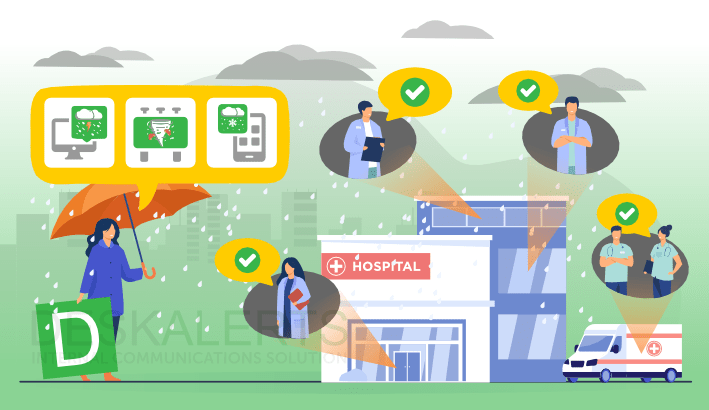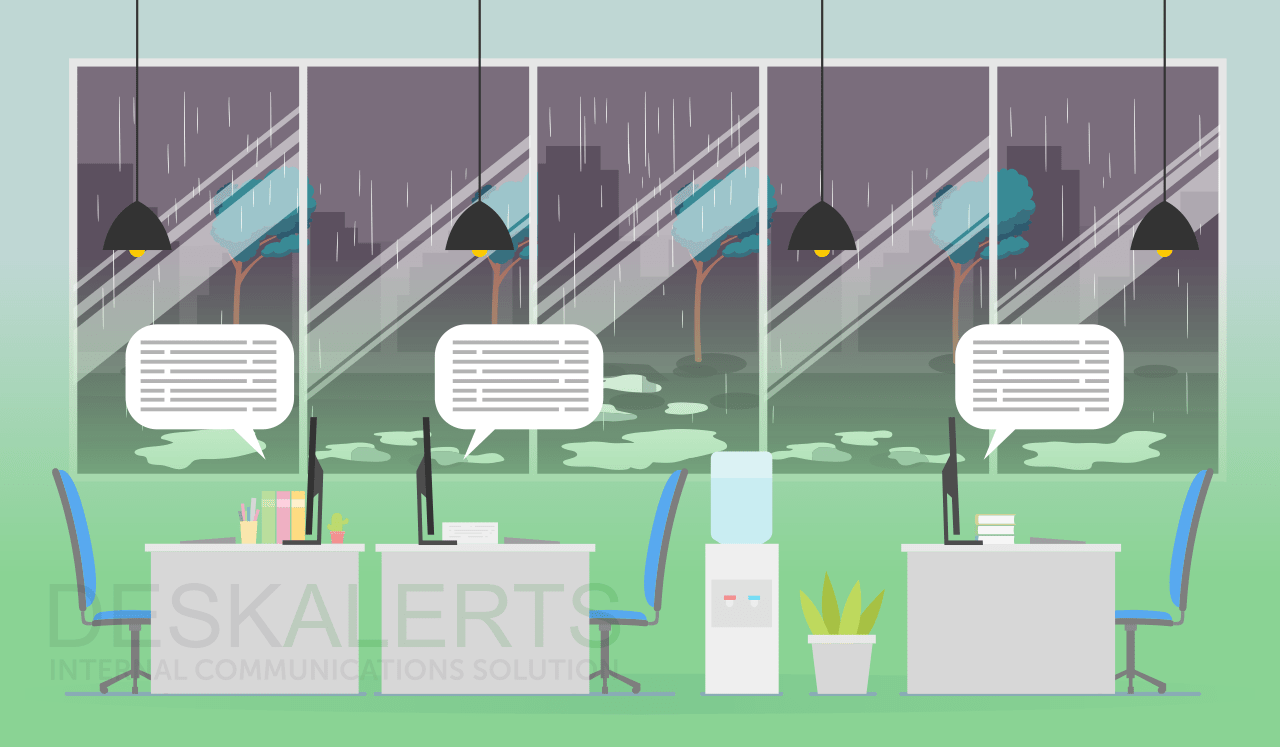13 min read
Top Internal Communication Trends in 2025 and How Businesses Are Adapting [+ Examples]
Historically, internal communication tracked engagement metrics like email open rates, clicks, or survey participation. However, in 2025, the focus...
4 min read
 Caroline Duncan
:
Jul 21, 2022 8:14:42 AM
Caroline Duncan
:
Jul 21, 2022 8:14:42 AM

Is your healthcare organization prepared for how it will continue to operate in the event of a severe weather episode? Inclement weather policies for hospitals are important to guide the organization when the weather turns nasty.
Hospitals and healthcare facilities are relied upon by the community to stay open and remain functioning during a range of adverse events, including inclement weather. When hurricanes, tornados, blizzards, heatwaves, and storms happen, hospitals generally don’t have the option to close like other organizations.
Having appropriate policies in place to deal with inclement weather can help hospitals to manage the situation so as to minimize disruptions and ensure the safety of patients and staff.
Learn more: Hospital communication system.
Your hospital’s inclement weather policy will set out guidance on what to do during a severe weather event. It should include information about what to do in a range of different circumstances, including:
Whether staff should attempt to attend the workplace
If there are any categories of staff (eg: administration) who can work remotely during inclement weather.
It’s important that employees understand that you have a policy around inclement weather. This includes what it means and what is expected of them in the event of a severe weather episode. If the first time employees hear about an inclement weather policy is when you have to activate it, then you’ve left it too late!
The following steps should be taken to ensure that your inclement weather policy is well-known throughout your organization:
When you need to communicate about extreme weather, here are the best practice principles to guide you:
In some cases, you’ll have a little bit of warning that an extreme weather event is on the way – for example a hurricane. Others might happen more quickly, such as flash flooding. No matter how much notice you get about the inclement weather event, it’s important that you communicate with employees as quickly as possible. Time is of the essence in any emergency situation, and the more time you can give employees to prepare, the better. It also ensures that you establish a “single source of truth” with your employees so that you can avoid rumors taking hold and misinformation spreading.
By using every communication channel at your disposal you have the best chance of reaching every employee. Send desktop alerts, mobile alerts, emails, digital signage alerts and text messages to let employees know that they need to take action.
The nature of hospitals is that not every staff member will be in the workplace when you need to alert them to an inclement weather situation. Some may be at home because they’re rostered on for a later shift, while others may be off-site on a break or conducting business elsewhere. Mobile notifications will enable you to contact any employee, no matter where they are.
The more times people are exposed to a message, the more likely it is that it will sink in. Repeat your message as often as needed to ensure that no matter how busy your staff are, they’ll get the message.
Inclement weather situations are evolving. A hurricane may make landfall later than expected. A tornado may have caused power to go off in the community. Keeping hospital staff informed throughout the event will let them know what’s happening in the outside world, both for their own personal knowledge and safety and also so they can be prepared if the inclement weather event will cause an increase in casualties.
Using DeskAlerts surveys module you can quickly send a message to all employees during an adverse weather event asking if they are okay. Using the analytics you can then determine who hasn’t answered and take steps to follow up and check on the welfare of those employees.
When the weather event is over and things start to return to normal, send your employees a survey to ask them what worked well and what didn’t. Did they feel the situation was well managed? This feedback can help you to revise your inclement weather policies and procedures to do a better job next time, if necessary.
***
Being prepared for a range of different inclement weather scenarios that could affect your hospital will help you to manage things smoothly when you need to. Ensuring you have good hospital communication system in place will help to keep your employees and patients safe.
An inclement weather policy is a document that outlines a hospital’s procedures, rules and expectations when there is an adverse weather situation that can disrupt service delivery.
Hospitals generally don’t close because of the weather as they need to be available to people 24/7. They achieve this by putting strategies and systems in place to ensure that they can continue to function even in bad weather.
Inclement weather refers to weather conditions that have the ability to cause disruption to businesses, schools and transportation. It can include floods, blizzards, snow, ice storms, hurricanes, tornados and extreme heat.
An inclement weather day is declared when the weather conditions affect how people will get to and from work and may also affect the operations of the healthcare facility.
![Top Internal Communication Trends in 2025 and How Businesses Are Adapting [+ Examples]](https://www.alert-software.com/hubfs/Top%20Internal%20Communication%20Trends%20in%202025.png)
13 min read
Historically, internal communication tracked engagement metrics like email open rates, clicks, or survey participation. However, in 2025, the focus...

14 min read
You could have the best communication strategy for change management, the right tools, and a clear business case, but if your employees don’t...

14 min read
Martyn’s Law will change how UK venues prepare for terrorist threats as it requires businesses to take proactive security measures to protect the...

5 min read
Challenging weather conditions are part of life all over the world - and when there is a major weather event it can be disruptive to your business....

2 min read
Weather events can have a significant impact on your business activities. Whether your staff work outside in the field or work from an office, Mother...

3 min read
Bad weather isn’t just inconvenient, it can be dangerous too. Floods, hurricanes, blizzards, tornados, extreme heat - just to name a few - can...